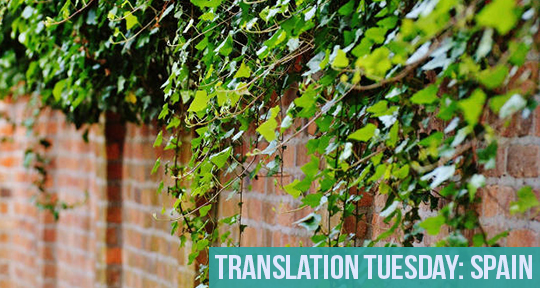To write seems a common salve for grief, and in this week’s Translation Tuesday, we’re reminded of why, in times of darkness, we turn to the written word for solace. Francisco Layna Ranz’s words are rife with the sharpness of new sorrow, clean and stark, yet with a keen eye he turns toward the motion that is an inevitable consequence of living. With language we may continue, and the action of admittance in poetry is a good thing, a good thing that results from continuing.
A Friend’s Son Died
A friend’s son died.
I pay my respects.
It’s Tuesday, cold between the stones, and I come back by Daroca Avenue.
Brick wall.
The bricks always look old. I don’t know: I think I’d start smoking again if I could.
It’s also too soon for sound. The proof is in the frost on the weeds and garbage.
It’s a question of innocence in the reading of what happens: soon and late
are words of now.
And all I can do is babble excuses for what’s left of my life, and everybody else’s life.
Of course a written letter is a sign that you’re getting old. For paper and for you it’s already much too late.
I know it makes no sense, but maybe I should go back to that crematorium and stay for what’s left of the morning.
Sitting on those benches, thinking of nothing.
Hear the traffic and think of nothing, the way the cold does.
A Howling, Right Here
There’s nothing like pain for being here
—Graciela Baquero Ruibal
A howling, right here.
In arm’s length of the cotton balls, in the silence of the sheets, it rings out,
grapples through the gaps in my breath,
covering it in ivy.
There’s plenty of night left to renounce your name.
It rings out, wringing anguish from its strains, usurping all immediacy.
You chain yourself to the memory to resolve it in river sand,
and you list people, objects, all those days
kept in storage so that they could open themselves to you today.
On the pillow, the fear that no one recognizes you, that you stain yourself
with blood, dry, unneeded, not vital, the cells already somewhere
irrelevant to respiration.
You don’t recognize the world, and your daughter, too, only becomes
a laurel when you ask what she’s been up to.
If you manage to overcome suffering, turn on the lights,
return to your shoes and leave to look for what was yours, well then,
tears, too, make themselves complicit and weigh on your spirit
like poisoned oranges and worms.
Is it that hell unhinges at your back?
Is there no one in this undergrowth to call you generously by your name?
If there’s any heart left to swear on, I do it to sue for innocence.
***
It’s an effective confession: it’s soothing, it calms the darkness
and its fissures, and by its grace you sum up the sweat
and the order of your hands.
You get up, drink water, see yourself in the mirror . . .
It’s Tuesday. Tomorrow you need to get up very early.
Translated from the Spanish by JP Allen
Francisco Layna Ranz has worked as a professor of Spanish literature at universities in Spain and abroad for over twenty years. He has published two collections of poems: Y una sospecha, como un dedo (2016) and Espíritu, hueso animal (2017). A third collection is on its way.
JP Allen’s poems, translations and nonfiction appear in Prairie Schooner, Southern Humanities Review, Tinderbox and elsewhere. He holds an M.F.A. from Johns Hopkins University and has received fellowships from The Vermont Studio Center and PlatteForum. You can find a list of his publications at https://johnpatrickallen.com/poetry
*****
Read more translated poetry on the Asymptote blog:

